Should America ban 'offensive' licence plates?
- Published
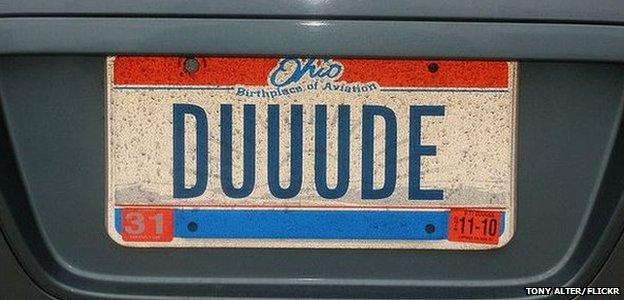
A licence plate displaying the Confederate Flag has sparked a US Supreme Court battle over the right to free speech. Have "novelty" plates gone too far?
Take a road trip across the US - anywhere - and you won't even need to stop or talk to the locals to know exactly what they most care about.
Americans wear their hearts on their bumpers. Colourful licence plates celebrating everything from the Boy Scouts to the soft drink Dr Pepper appear in the rear view mirror.
For visitors it can be fascinating and bizarre to discover the range of niche interests that proud motorists identify themselves with.
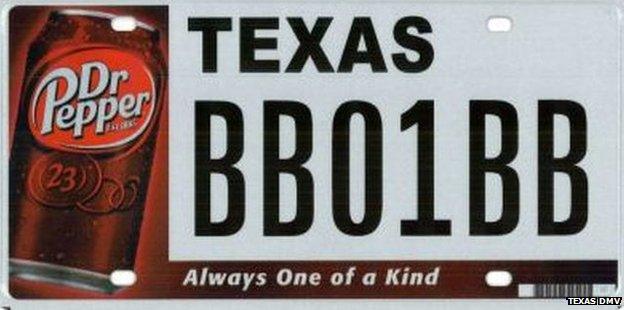
Texas' Dr Pepper plate - and dozens others that did not have enough interest - were expected to be scrapped in 2015
Anti-abortion slogans like "Choose Life" compete with "Mighty Fine Burgers" and "Trees Are Cool".
Goofy personalised registrations like DUUUDE and BOO81ES park side-by-side with sombre memorials to 9/11 victims and cries to save the environment.
But among these odd bedfellows there is one plate which stands out above all others for provoking controversy.
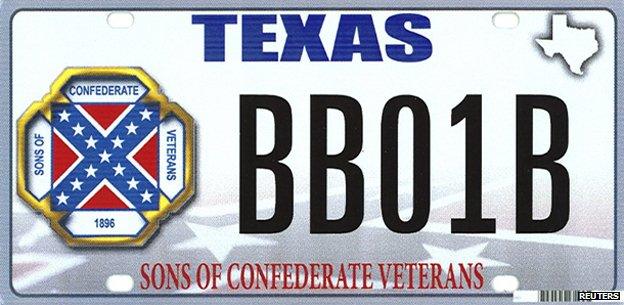
The design features the Confederate Flag and the words "Sons of Confederate Veterans 1896".
It was rejected, twice, by the Texas Department of Motor Vehicles, who ruled that "a significant portion of the public" find the flag offensive, due to its historical association with slavery.
"Why should we as Texans want to be reminded of a legalised system of involuntary servitude, dehumanisation, rape, mass murder?" asked state Senator Royce West at a public hearing about the plates in 2011.
This could easily have been the end of the matter - rude and abusive slogans are vetoed every day by the 50 state motoring departments, each of whom has slightly different criteria for acceptability.
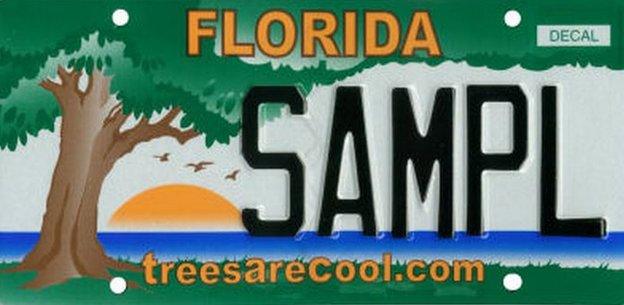
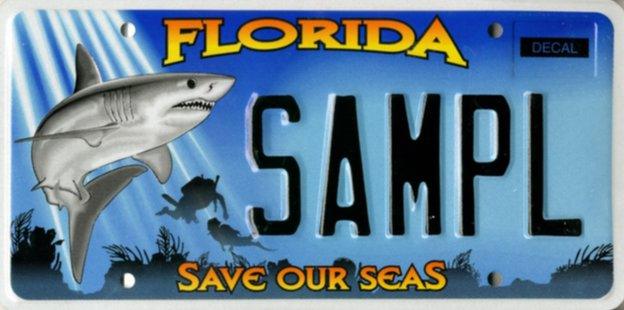
Specialty interest plates make money for the state and the organisation that backs the design
But what happened next drove the issue of "novelty" licence plates straight up the highway out of Texas and into the highest court in the land.
The Sons of Confederate Veterans, sponsors of the controversial plate - went to the US Court of Appeals for the 5th Circuit, where they successfully argued that to reject their design was to restrict their right to free speech - protected by the First Amendment.
The case now stands before the nine Supreme Court justices, external - who must consider how the rights of constitution apply within these 12-by-6in (30-by-15cm) metal plates.
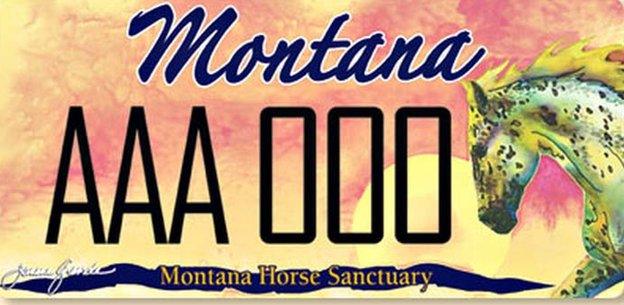
How did it come to this? How did an object so utterly dull as a vehicle registration plate become a battleground for the rights of Americans?
"What began as reasonable self-expression has become divisive and confrontational," says Dan Neil, automotive columnist at the Wall Street Journal.
Emblazoning the Confederate flag on your car "is like waving a red rag to a bull - they're daring you to be offended by their politics", he says.
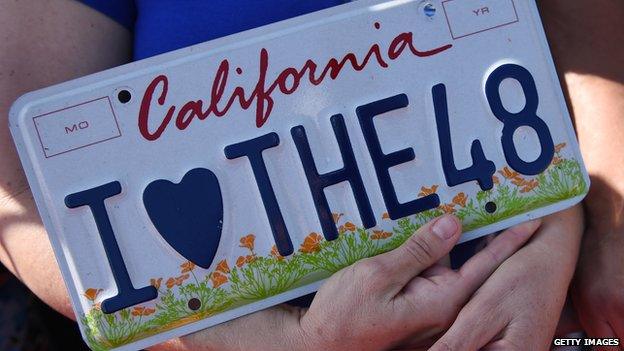
The story of licence plates begins at the turn of the 20th Century, when the first "horseless carriages" began careering around towns - frightening children and causing anxiety for authorities.
In 1907, the state of Texas decreed that all motorised vehicles must be registered - and drivers must display their digits.
Many of the first plates were entirely personalised - crude homemade efforts, cobbled together from wood, roof tiles and even leather.
Jump forward to 2014 and licence plates brought in $17.6m in revenue for the Texas state authorities - drawn from two distinct types of plates.
Personalised "vanity" plates allow drivers to select a configuration of up to seven characters - typically spelling out a nickname, or humorous slogan - often something on the cheeky side.
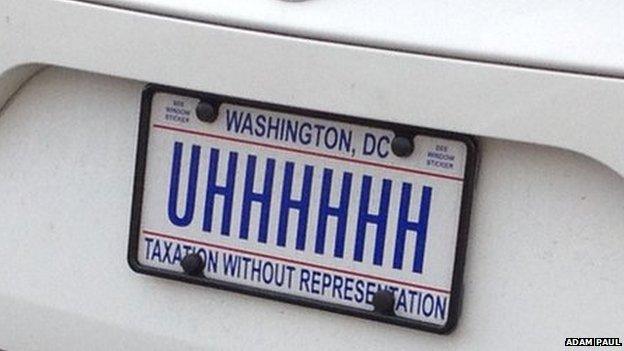
These are not the subject of the dispute in the Supreme Court. The case relates to the other type - "specialty plates" - which carry pictures, symbols and slogans supporting a cause or an organisation - often a charity campaign, a university, or a sports team.
These groups apply to the state to have their specialty plate authorised to be licensed to motorists for an additional fee - which raises funds for the state and the organisation.
Texas offers 385 varieties of these specialty plates - among which the most popular topic is the US military and its veterans - 92 of these plates pay tribute to them.
But while Texas authorities were happy to issue plates commemorating US soldiers who have fallen in modern wars, they are not willing to stamp their badge on a plate which honours soldiers who fought for the Confederacy.
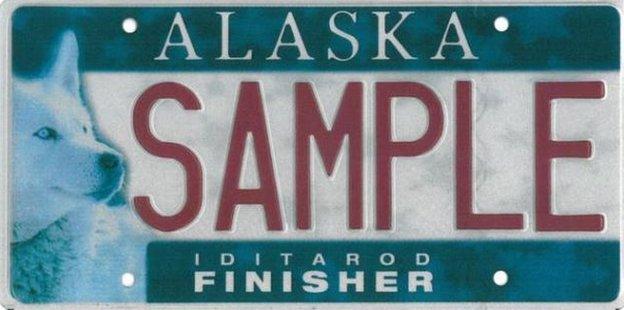
Alaska offers a licence plate for Iditarod dog sled race finishers only
The state argues it is "fully within its rights to exclude swastikas, sacrilege, and overt racism from state-issued licence plates that bear the state's name and imprimatur."
Opponents say this violates the free speech of the drivers who would select the licence plate - a view upheld by the Court of Appeals.
But the state counters that licence plates are government property, on which the government can decide its own message - which would not breach the First Amendment.
At the heart of this case, then, is a simple question for the Supreme Court justices.
"Does my licence plate speak for me, or my state?"
Subscribe to the BBC News Magazine's email newsletter to get articles sent to your inbox.
- Published30 August 2013
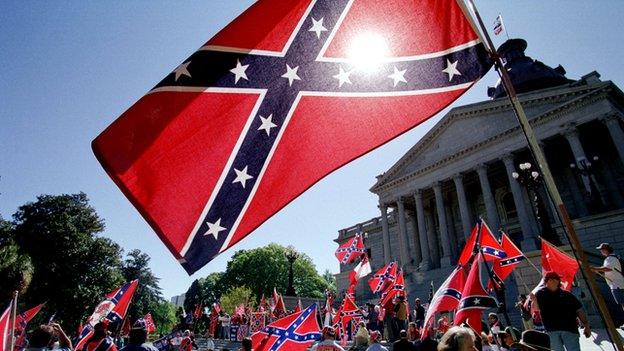
- Published10 March 2014

- Published8 October 2010